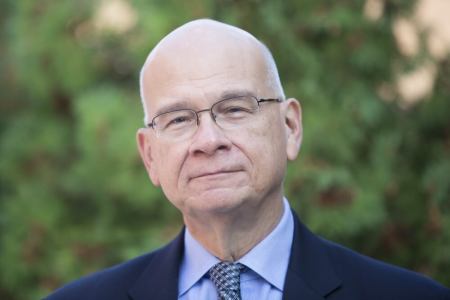Tim Keller Makes Sense of God for Skeptics, Argues Secularism Is Declining (Interview)

Pastor Tim Keller is on a mission to make sense of God, and if you ask him, Christianity not only makes sense, it offers so much more than what many realize.
Human beings crave meaning, satisfaction, identity, justice, and hope, Keller argues, and the Christian faith provides abundantly for those yearnings.
Rarely, however, do people examine how they arrive at their beliefs, said the pastor of Manhattan's Redeemer Presbyterian Church in a recent interview with The Christian Post.
In Keller's latest book, Making Sense of God: An Invitation to the Skeptical, the 65-year-old author of the New York Times bestseller The Reason for God continues to engage objections to the Christian faith. But this time he takes a slightly different approach. Instead of pure apologetics, Keller makes an invitation. He recounts in the preface that at a "skeptics welcome" discussion at his church, a man who was raised Christian but lived for some years as an atheist told him, "I've never really looked this carefully at my foundations. I haven't thought things out for myself. Thanks for this opportunity."
Skeptics can consider this book an opportunity where they are welcomed to examine how and why they think like they do.
"Most people don't do argument anymore," Keller told CP when asked why so few seem to have done the hard work of studying why they believe what they believe. "Everybody thinks that their view is self-evident. And people who just don't see it are nuts."
Sociologist Christian Smith's book on the religion of young adults and teenagers is particularly illuminating on this point, Keller noted; Smith's book shows that "most young adults have very strong moral views and convictions, but they also believe that — if you ask them why is that right or why is that wrong—they say 'Well, everybody knows that.'"
Indeed, not everybody knows such things because if they were self-evident, most would agree. But if people are genuinely searching for evidence, the Christian faith will not disappoint.
Keller is routinely praised for his intelligent, extremely articulate preaching. USA Today columnist and Fox News commentator Kirsten Powers is one such person who through his ministry abandoned atheism and received Christ. Powers, who has since joined the Catholic Church, wrote in a December 2015 Christianity Today article that Keller "might be the most persuasive Christian apologist and evangelical pastor of his generation (if not the century)."
In a typical sermon, Keller masterfully weaves in relevant history, politics, and literature while expounding on the scriptures, and effectively exposes the weaknesses of secularist and atheistic worldviews. He does the same in this book.
Perhaps no issue is more bitterly contested today in the public square than what it fundamentally means to be human – how people define themselves. As cultural norms and institutions shift, especially about sexuality and relationships, American society is swimming in a sea of identity politics. Keller contends that such modern and postmodern notions of truth, identity, and freedom are failing us and only Christ can satisfy all three.
While some may chafe at Christianity's "exclusionary" claims, no one can circumvent truth claims altogether, the author argues. And the kinds of truth claims that you hold are inextricably linked to how you define your identity. For those who believe in Jesus's message, "you believe in a truth, but not a truth that leads to exclusion," Keller writes in the book.
"If I build my identity on what Jesus Christ did for me and the fact I have an everlasting name in him by grace, I can't on the one hand feel superior to anybody, nor do I have to fear anybody else. I don't have to compare myself with them at all. My identity is based on somebody who was excluded for me, who was cast out for me, who loved his enemies, and that is going to turn me into someone who embraces the Different," he continues.
Such an other-oriented, humble posture informs Keller's perspective on the times even as narratives about the "rise of the nones" and an increasingly "post-Christian America" appear in the headlines. The Manhattan pastor is genuinely optimistic about the future and contends that what is happening in the earth today reveals that God is on the move.
"In the past there was hardly anybody who was secular," Keller told CP. "In the future there will be significant numbers of people who are secular more than have ever been in history. But, the facts on the ground are that Christianity and Islam in particular are growing faster than the population. And that over the next 25-45 years the number of people who say that they are secular, the percentage of the world's population that is secular, is actually going down."






















